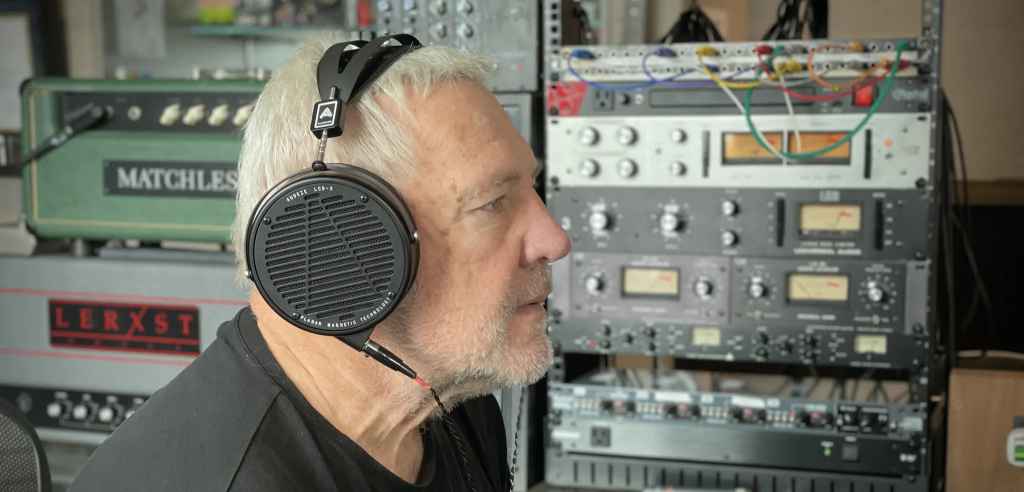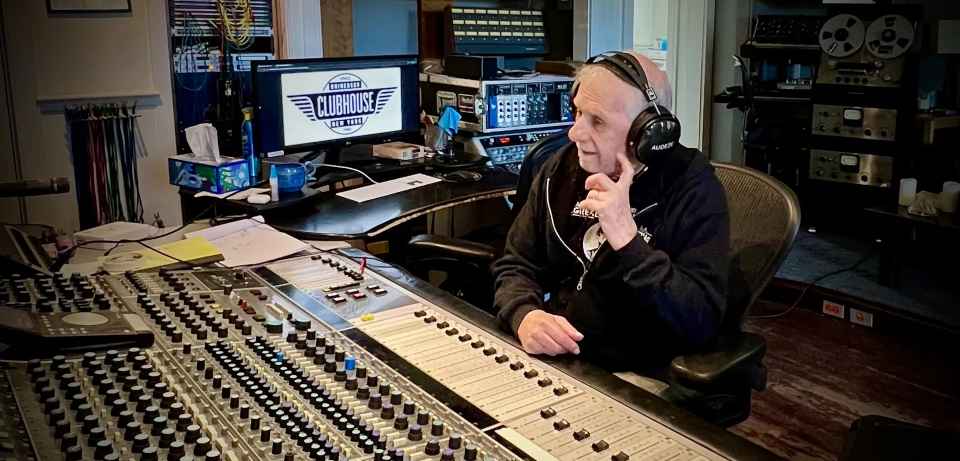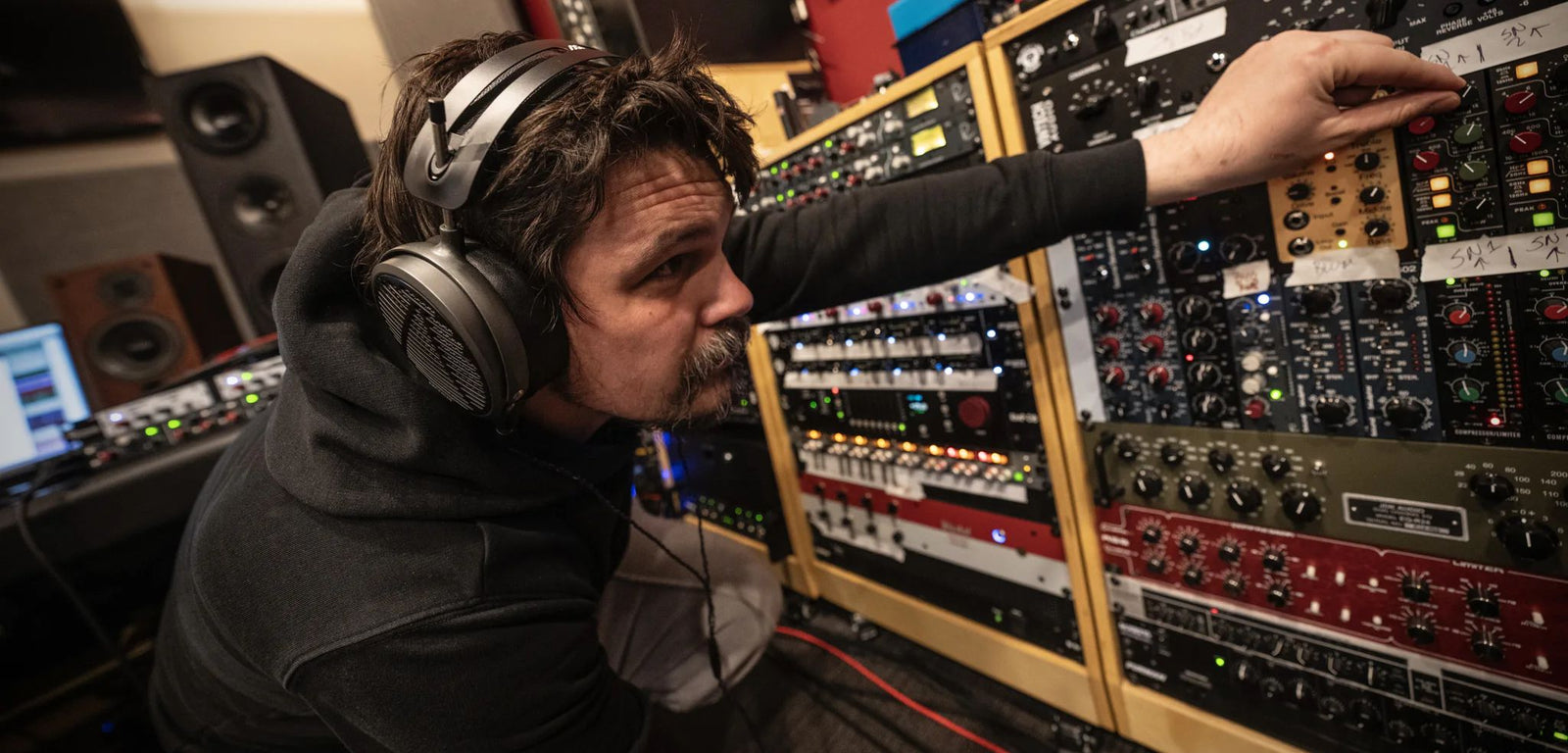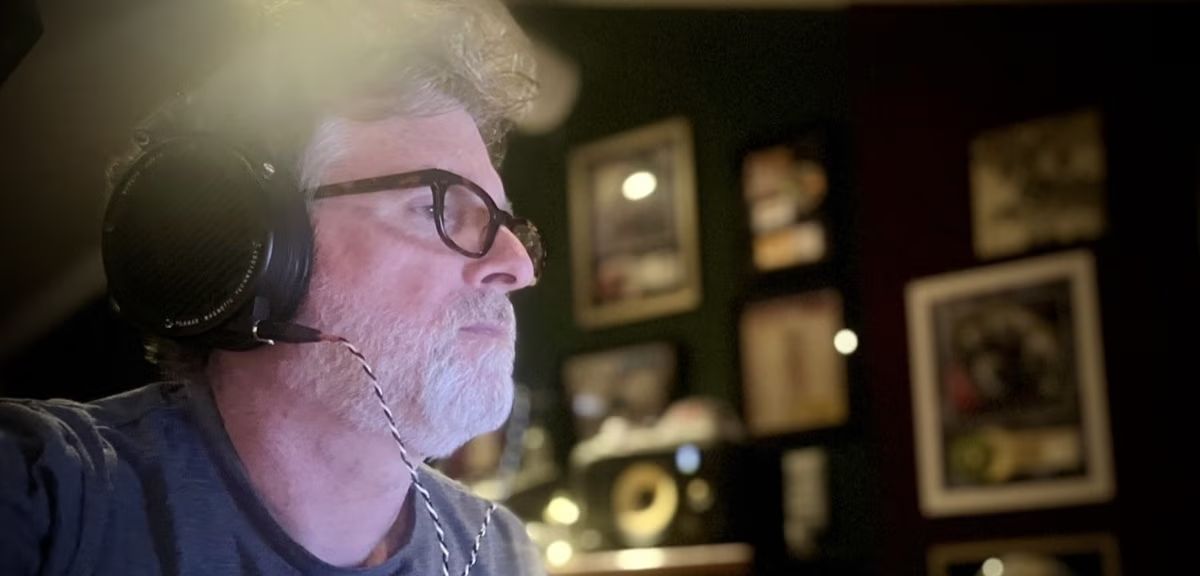
Alex Lifeson is a Canadian musician, best known as the guitarist of the Canadian rock band Rush.

Elliot Scheiner is an engineer and producer. He started working for Phil Ramone at his A&R studios which at that time was considered one of the best studios in the country.

James 'Jimmy T' Meslin is a Grammy winning recording, mix, and live sound engineer based out of Long Island, NY. He's probably best known for his work with prog-metal giants Dream Theater and their affiliated projects.

Dave Way has been mixing longer than he hasn’t. Platinum albums, No. 1 singles, 4 Grammys, 19 Billion streams with names like Michael Jackson, Fiona Apple, P!nk, Xtina Aguilera, Ringo Starr, Iron And Wine, Sheryl Crow, Marshmello, Fall Out Boy, Kesha, Macy Gray, TLC, Victoria Monet, Sons Of Anarchy, Tracy Chapman, Ben Folds, John Doe, MC5, Spice Girls, Weird Al, Paul McCartney, Bobby Brown, Mick Jagger and many, many more.
November 11, 2020
Based in Brooklyn NY, Chris Lightcap is an acoustic and electric bassist, composer, improvisor and bandleader working in the fields of jazz, experimental, rock, and contemporary music. As a band leader he has released six critically acclaimed albums to date, and has collaborated with a wide-ranging array of musicians including Regina Carter, Joe Morris, Matt Wilson, and Nels Cline, as well as fellow Audeze artists Julian Lage, Craig Taborn, Ches Smith, Ingrid Laubrock, Dan Weiss, David Breskin, Tyshawn Sorey, Ron Saint Germain, and Mary Halvorson.

Here's our chat with Chris:
Can you pick out any favorites from your work that you're particularly proud of?
Last year I put out my sixth album as a bandleader, SuperBigmouth (Pyroclastic Records, 2019). It was co-produced by my friend David Breskin and is an octet combining my two existing bands, Bigmouth (Tony Malaby on tenor saxophones, Craig Taborn on keyboards and Gerald Cleaver on drums) and Superette (Jonathan Goldberger, Curtis Hasselbring and Dan Reiser). I developed the music over the course of two years and I’m incredibly proud of the work that the musicians put into the project. It was recorded by Andrew Taub at Brooklyn Recording and mixed by Ron Saint Germain.
Another Breskin-Saint project was Superette (Royal Potato Family, 2018), which features my four-piece electric band of the same name along with Nels Cline and John Medeski as guests.
I also put out two albums with my band Bigmouth on the Clean Feed label: Deluxe (2010) and Epicenter (2015).
As a bassist/collaborator some of my favorite albums with which I’ve been involved include Craig Taborn’s Daylight Ghosts (ECM, 2017), Regina Carter’s Reverse Thread (E1, 2010) and Circle Down (242 music, 2009) by Chad Taylor.
How would you define your main role on most of the projects you work on?
My role varies depending on the project. On my own records I’m the main composer, bandleader, and producer as well as the bassist. Then there are a lot of bands I’ve played bass in over the years where I take a more collaborative approach - giving feedback on production and arrangements, contributing material, suggesting music, etc - Regina Carter, Craig Taborn and Matt Wilson’s groups are examples of that. And sometimes I’m more of a “hired gun” - just show up and get the job done. I’m down with all it, and I like the variety.
How did you get started in music? What kind of music did you listen to while growing up and how has that progressed?
I was fortunate to be raised in a household that placed a high value on music and art. My parents listened to all kinds of music around the house but were particularly fanatical about classical music. I grew up in western PA, and we took many trips to hear the Pittsburgh Symphony. I didn’t appreciate it as much as I should have at the time but I got to hear Andre Previn and Lorin Maazel conduct on a regular basis, as well as world class soloists like Lynn Harrell and Itzhak Perlman. I started studying violin at 9 but quickly became a rock music obsessive, so by the time I was fourteen I decided I wanted to play bass guitar in bands with my friends and began teaching myself how to play on my cousin’s Fender Precision. I got into R&B and Soul music which then got me into electric jazz and that’s when I dug up my dad’s Ahmad Jamal, MJQ and Duke Ellington albums. It was only a matter of time before I’d want to start playing upright bass; at 17 I finally ditched the violin and dove into the upright head first, studying with classical teachers while listening to and playing as much jazz as possible, in addition to everything else. Throughout college, studying classical music and jazz as well as composition and still playing in rock bands, my listening habits broadened as I got deeper into the music and by the time I moved to New York, I might be checking out Monk, Neil Young, Coltrane, Xenakis, Cecil Taylor or Bach.
Can you name any factors you feel majorly influenced the course of your musical life? Heroes, role models, moments, interactions, etc?
Well, first and foremost, my family was a major influence. On top of all the recorded music playing around the the house, my mom’s been a classical pianist throughout her life and plays by ear and sings. My dad isn’t a musician but he loves music and is an avid record collector and an audiophile. As a teenager he was into early rock and roll like Chuck Berry, and then when he went to college he got into jazz and folk and classical music. My parents listened to the standard classical fare but also were into more modern stuff like Charles Ives and Messiaen. Also my cousins, Mark and Steve who lived in Philly were a big influence. They were like older bothers I never had - Steve played keyboards and bass guitar and it was his Fender I borrowed when I started on bass. And Mark played classical tuba and guitar and was into all the harder, hipper, stoner-type stuff I never was exposed to in our house. Mark went on to become an accomplished musician, studying composition at CalArts, founding the band Acetone and working with Matmos and the Radar Bros. So there was a lot of music circulating throughout the family.
Later on, a major influence was the drummer Ed Blackwell, whom I studied and played with in college. It was fortuitous because I was just starting to get heavily into Ornette Coleman and Charlie Haden’s music and here I was getting to learn from one of the greatest drummers to come out of that universe. Being around a master on that level, of course my understanding of the instrument and music in general grew every time I came in contact with him. But the example he put forth as a human being also had a huge impact… when I met him he was gravely ill and had lived on dialysis for over 15 years. He was clearly in constant pain and would hobble around slowly but then when he got behind the drum set he’d play with as much fire, energy, swing and creativity as any drummer who ever lived… he exemplified humility and gratitude and reminded anyone who heard him play that it’s such a privilege to experience great music. I couldn’t come up with any legitimate excuses for anything after I met him. He was a gift.
Can you briefly describe a moment of frustration from your past work, and what you may have done to overcome the obstacles? Would you approach it differently now?
There were times when I was younger when I didn’t feel like I could play with certain drummers. No matter where I’d try to rhythmically place myself, it never felt right. It took me a few years to realize that my sound wasn’t working. It’s not that my sound was “bad”, per se, but I wasn’t really playing with an awareness for sound. If a bass player’s sound doesn’t blend in a way that works with a drummer’s ride cymbal, it won’t ever rhythmically feel right. Sonic awareness has to be there between all the musicians before you can deal with any of the other aspects of the music. When I play now it’s the first thing I try to attune myself to… there are so many aspects of the sound environment that are out of our control already and so it’s crucial to be ready to meet each situation with that awareness.
Is there any gear you find yourself turning to most when working on a project? What are some of your favorite tools/instruments recently?
I’m fortunate that the first upright bass I ever owned turned out to be a great instrument that’s still my main instrument today. It’s a pretty standard, “no-name” German bass from about 1910 that I got in 1989 from an old retired Pittsburgh Symphony player named Joe Wallace. He actually had a pretty amazing history. I recently dug up his obituary... Like me, he started on violin as a child, and later switched to bass and played jazz gigs all over the Pittsburgh area. He was hired to play with the Pittsburgh Symphony in his 20s even though he had no previous experience playing classical music. A few years later, Fritz Reiner became conductor and immediately fired the entire bass section - except for Joe. He played with Coleman Hawkins and Roy Eldridge and he told me stories about giving Ray Brown lessons as a teenager before Ray moved to New York. After he retired in 1979 from the PSO he started selling basses out of his house.
Anyway, when I went to him I had only been playing for a year, so I had no idea how to pick out an instrument… I had a tiny budget and I asked him for the most inexpensive carved basses in the shop and he eventually showed me the one I have now… it was priced really low, a little more than the plywood basses he was selling… he said both he and his son had used the bass on gigs a lot; all I could really tell about the bass at the time was that it was loud. By the time I moved to the city, I came to realize that it had a huge crack on the top that had never been property fixed, causing it to be unstable and have a much thinner sound than it should. It needed a lot of costly repairs, which were eventually performed when I had the money. A few years later when I started flying all over the world with it, it of course got damaged now and again. But every time it was fixed, it became more stable and its fundamental would bloom a little more and the tone would become more complex. At this point it really strikes a balance between being focused and warm with plenty of volume, and I get lots of compliments from engineers about how easy it is to record and mic in a live setting. I got very lucky with that bass.
For electric basses I have a few older bass guitars that are my favorites… I have a ’64 Fender Precision that is my “go-to” for just about anything I get called for on electric… those old fenders are magic. It, like most of my other electrics, has flat wound strings on it. I also have a ’66 Precision with round wounds… it’s super light and has an amazing neck. I actually stopped playing electric bass for the first seven years I lived in New York but when I got back into it, the instruments I initially gravitated towards were old hollow body bass guitars and the ones of those I currently use are either a ’68 Guild Starfire II or a 1952 Kay K-162 bass (pictured above). When I have to fly with an electric I usually bring my ’83 Precision bass which was the first bass I actually owned, paid for with six months of lawn mowing money when I was 15. It’s indestructible (so far).
When I’m recording electric bass at home I always run it through my 1965 Ampeg B-15. Most studios these days have vintage B-15s in-house which I’ll typically use, although for SuperBigmouth at Brooklyn Recording I used their Versatone amp, which is a very rare tube amplifier used by Jack Casady and Carol Kaye that gets an amazing tone.
When playing upright in a live setting I go for the most natural acoustic tone possible and mic it with an Audio Technica ATM 35 condenser, sending it to the house and monitors. If necessary I also plug the upright’s pickup into a B-15 unless I need something more powerful, in which case I’ll request an Orange AD-200B or an Ampeg SVT with a 4 x 10 cabinet. If I’m playing both upright and electric I run them into the same amp and use a Radial Bassbone pedal to switch between them. I also have a bunch of other pedals I use with electric bass if the situation calls for it.
For recording at home I have a Soundelux ifet7 which is a modern copy of a Neumann U47 FET. It works well on both upright bass and on amps. In studios I’ll request that the engineer run both a Neumann U-47 tube condenser and and an RCA ribbon mic like a 44 or a 77 if they’re available.
Do you have any words of wisdom for people who might aspire toward a similar path for their own careers?
It’s important to prioritize musical situations and collaborations that inspire and challenge you, because it’s in those environments that you’ll flourish and do your best work. But at the same time I think musicians shouldn’t be afraid to at least give a shot to a gig even if they’re unsure as to whether or not it will be musically worthwhile. I’ve been pleasantly surprised more often than not in situations like these and they’ve often led to long lasting, meaningful relationships, or were challenging in ways that made me a better musician. And if it doesn’t work out, you don’t have to do it again and it won’t kill you.
How long have you been working with headphones, and how do you typically use them in your workflow?
On records I’m producing, getting an objective sense of what a mix “is” can be a constantly moving target and is therefore a challenge to say the least. Playback systems, speakers… even the time of day or one’s mood seems to make a mix sound radically different than it did the last time you heard it. Headphones in this context are critical tools that reveal more and bring a measure of consistency to the proceedings. Whether I’m in mixing or mastering sessions, you’ll find me regularly going back and forth between monitors and headphones. When it comes to playing bass on other people’s records, after the first take when everyone goes into the control room to hear the playback I typically grab some cans so I can take a step back, hear the bass more clearly and have a sense of how my playing relates to what’s happening around it. Does it sound like I can hear my pitch? Am I overplaying/underplaying, etc… I never feel like I can hear enough of those small bass details through most studio monitors. At home, I have a small studio setup that I use for recording bass tracks for other people’s projects, for composing and making demos of my music for my different bands, as well as various electronic side projects. In that capacity I’d say I use headphones 75 percent of the time as opposed to my monitors to circumvent the acoustic anomalies that are par for the course with apartment setups. And of course headphones are essential for working late at night.
How have your Audeze headphones affected your work? Can you tell us what you've been working on with them so far?
I’ve been a fan of Audeze headphones since I produced the Superette record and borrowed David Breskin’s EL-8s at Ron Saint Germain’s mixing studio. I was impressed with the dynamic range and bass extension that they had. A year or so later, while mixing SuperBigmouth, Saint had just received his LCD-Xs and was raving about them. I have to admit that I’m often skeptical about high end headphones but when I put them on I got it instantly. The sound stage, dynamics, detail, air and sense of room just blew me away. My go-to headphones were some good lower priced cans which I brought along for reference, but once I tried the LCD-Xs I couldn’t stop reaching for them. A lot of critical decisions about the mix were made based on what I was specifically hearing with them. I just hear so much more, in such a balanced way compared to any other headphones I’ve ever used. Now I have my own pair and I’m in the middle of mixing a project for which they’ve been a major asset in dialing in the type of reverb I want. In my spare time I’ve been going through my vinyl collection and experiencing the music in a whole new way. They're a game changer.